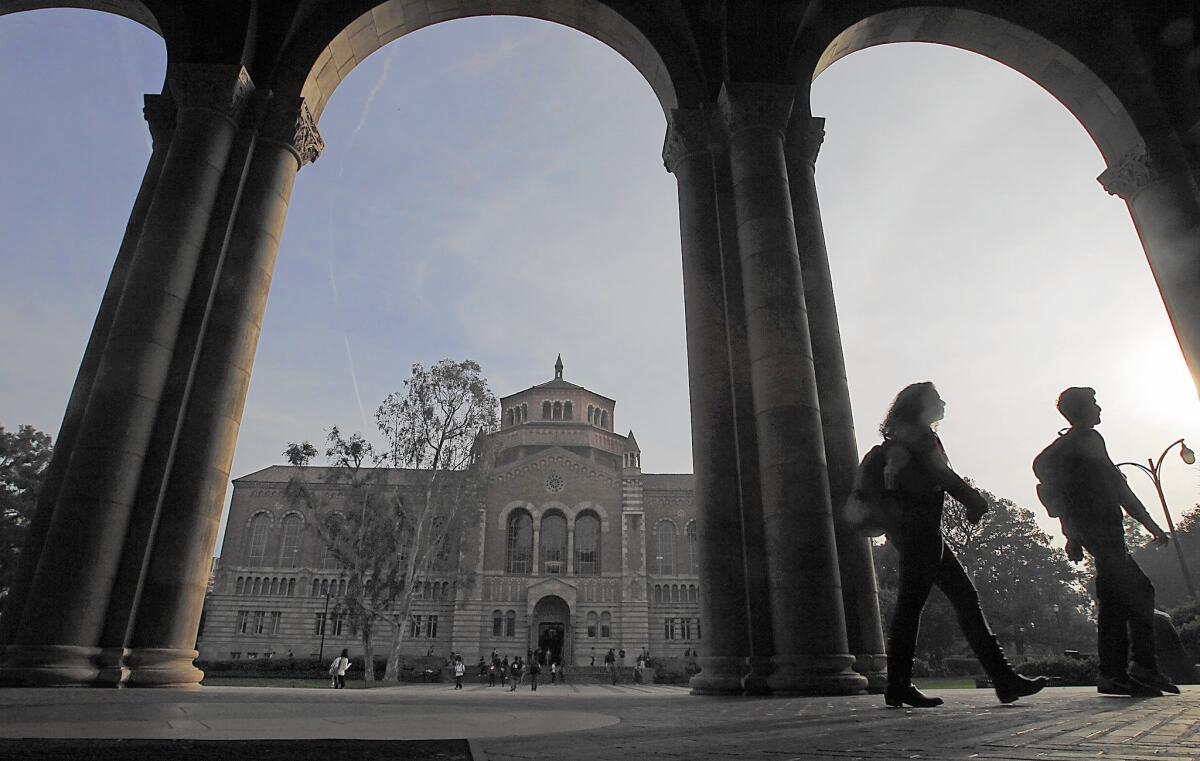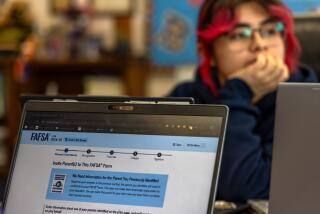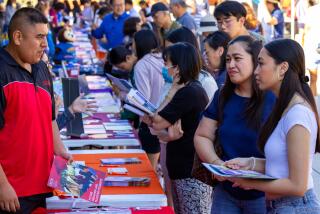Higher Learning: The sooner you turn in the federal student aid application, the better

With the dawning of the new year, millions of students in California and the nation are turning their attention from winter break to filling out a form that will determine their eligibility for college financial aid.
At least they should be. The often intimidating FAFSA — the Free Application for Federal Student Aid — became available Jan. 1 for the 2016-17 academic year.
New and returning students seeking financial aid must fill out the form, which is required to receive federal Pell grants, federal student loans and work-study opportunities.
Many state and private institutions also use the application information to determine eligibility for nonfederal aid. California uses the information to determine eligibility for Cal Grants and other state aid. The deadline in California to submit the application is March 2.
But many students still skip the form, believing they or their family earn too much to qualify for financial aid.
Others put off applying until the last minute, often missing out on federal and state-based aid that is awarded on a first-come, first-served basis, officials said.
“The process can be a challenging one even for those with college knowledge and even more so for those without that experience,” said Lauren Asher, president of the nonprofit Institute of College Access & Success. “The FAFSA is the gateway not only to federal grants and loans but most college aid. And you never know what you’re eligible for if you don’t apply.”
State and federal agencies and many colleges are working to get the word out to students and their families on the importance of filing and doing it early.
Cal State Los Angeles, for example, will send an email blast to all its students as well as display posters and banners across the campus, said Jonathan Choy, associate director of financial aid.
A number of workshops will also be held to provide information on the application as well as other loan opportunities and scholarships.
In 2014-15, more than 80% of the 25,000 students at the University Hills campus east of downtown received financial aid, Choy said. Many students still have trepidation about the application, even though it has undergone modifications over the years.
“The average time to fill out the form is about 15 to 20 minutes, and a continuing student would take even less than that; it’s a lot more user friendly,” Choy said.
Still, there are ongoing efforts to further streamline the student aid program, including eliminating the application altogether and using only household income and family size to determine eligibility for Pell grants.
The federal government spends more than $150 billion annually on student aid. But former U.S. Secretary of Education Arne Duncan said a year ago that more than 1 million high school seniors each year fail to fill out the Free Application for Federal Student Aid form, even though most would be eligible for Pell grants, which are designed for low-income students.
The online form, used by most applicants, allows students to skip questions that don’t apply to them and provides direct links to federal income tax information.
The form requests students’ and parents’ income, savings and other assets as well as liabilities from the preceding tax year to calculate how much they are expected to contribute to education costs. That has proved troublesome for applicants who typically don’t receive W-2 forms and other tax information until well into January or later.
But there is some relief on the way. Under reforms announced in September by President Obama, students applying for the 2017-18 school year will be able to file the application as early as Oct. 1, 2016, rather than waiting until Jan. 1, 2017.
Students will also be able to use earlier income information. For example, on the 2017-18 application, students can use information from their 2015 taxes rather than that for 2016.
“There will be more time for high schools and others to work with students and their families and obtain the tax data needed to fill out forms,” Asher said. “It will be a much better alignment between the financial aid process and the college application process.”
Officials say students should be prepared to provide their Social Security and driver’s license numbers, parents’ Social Security numbers and birth dates, 2015 income tax returns or estimates, W-2 forms and bank statements.
High school guidance counselors and college financial aid offices can answer questions and provide assistance. The California Student Aid Commission also has information about the application and financial aid workshops throughout the state.
Applying for financial aid is free at FAFSA.gov.
Twitter: @carlariveralat
More to Read
Start your day right
Sign up for Essential California for news, features and recommendations from the L.A. Times and beyond in your inbox six days a week.
You may occasionally receive promotional content from the Los Angeles Times.







